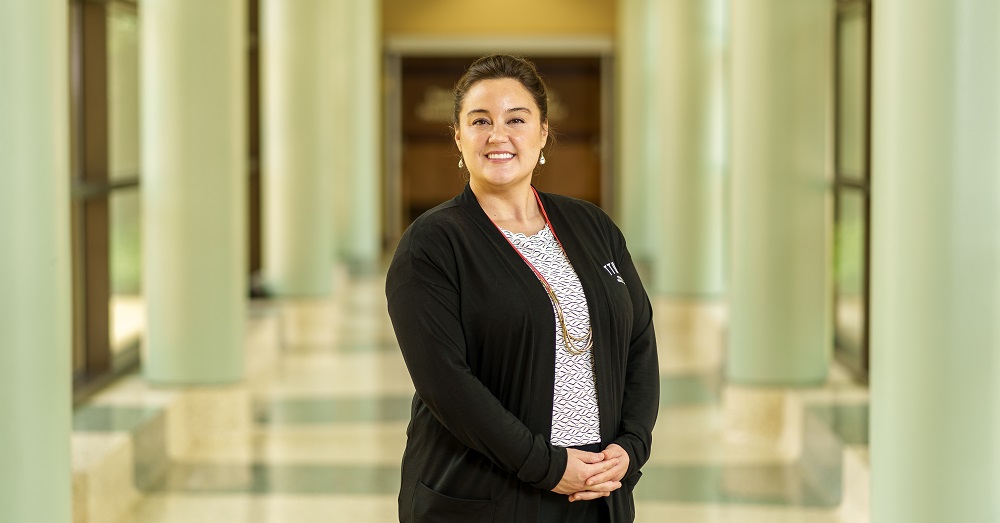Feeling More Confident in a New Job or Career

Logan Winkelman, Ph.D.
Starting a new job or career can be anxiety-inducing whether you just graduated college or decided to transition career paths. Logan Winkelman, Ph.D., assistant professor and program director in Clinical Mental Health Counseling at Texas Tech University Health Sciences Center (TTUHSC), uses her background as a career counselor to help those starting a new job or internship feel more confident.
“Something I recommend is continually being adaptable and eager to learn new things,” Winkelman said. “Understand that there’s going to be things that you don’t know, and there’s going to be times when you feel lost.”
A study done by Gallup showed that 70% of the workforce is disengaged at work. The other 30% were engaged because they had cultivated relationships at work with their colleagues. Winkelman emphasized the importance of seeking out those relationships in the workplace.
“People don’t leave jobs for jobs; they leave jobs because of people. People can make or break the workforce and the fulfillment they get from the job. So, it’s critical to begin working on those relationships.”
Among some of those starting new jobs are older and middle-aged people who might be starting a new career or are coming back to work after retiring. Winkelman suggested the following to help them better acclimate themselves to a new position.
“Middle-aged or older employees can feel more confident in their career change when they focus on what they’re bringing to the table. Their experiences, their skills and being able to convey that to their supervisors. Also, keep investing in your own personal development. Just because you’re coming in with 20 years of experience, that doesn’t mean you should be done learning. Continue to look for webinars or conferences to attend so you can build your skill set.”
It doesn’t fall solely on a new employee to feel comfortable in a new work environment. It’s also up to management and other employees to help them feel welcome from the start.
“You really want to make sure that you’re taking the time to orient people to not only the job but the expectations and policies,” Winkelman said. “Making sure that the employee knows where to go to the restroom and where to get food, all those things we take for granted once we understand the lay of the land. That’s something we can do as employees or managers to help people feel welcome.”
Welcoming employees is a good start, but the culture of a workplace plays an even bigger role when it comes to making employees feel accepted long-term.
“We need to think about fostering good workplace culture,” Winkelman said. “Are we building trust and are we leaning on our values? Day-to-day tasks are enforced through that behavior.”
Social events display good workplace culture and inviting new employees is an excellent way to welcome them to the team.
“Invite new hires to social events,” said Winkelman. “If you’re going to lunch with a colleague, bring that new employee along. It may not be a big deal to you, but it’s going to mean a lot to someone who’s brand new.”
Burnout at work can deteriorate one’s mental health and well-being. Winkelman shared tips to remind people to leave work at work and focus on themselves.
“Setting aside time for things you enjoy like exercising, reading and spending time with family and friends can help you recharge. Practicing mindful breathing techniques and being present in the here and now can help reduce the feelings of being stressed. Seek support, it doesn’t have to be through a mental health professional but seek support through your family and friends. The final one is to set boundaries. The way we can do that is creating a work-life balance, setting boundaries around your schedule and responsibilities first.”
Burnout is more likely to occur if you don’t implement self-care activities, practice mindfulness, seek support or set boundaries at work.
Related Stories
The John Wayne Cancer Foundation Surgical Oncology Fellowship Program at Texas Tech University Health Sciences Center Announced
TTUHSC is collaborating with the John Wayne Cancer Foundation and has established the Big Cure Endowment, which supports the university’s efforts to reduce cancer incidence and increase survivability of people in rural and underserved areas.
Making Mental Health a Priority in the New Year
Sarah Mallard Wakefield, M.D., a psychiatrist with Texas Tech Physicians, talks about strategies to combat widespread and growing anxiety.
TTUHSC Dean to be Inducted into the National Academies of Practice as Distinguished Fellow
Gerard E. Carrino, Ph.D., MPH, dean of the TTUHSC Julia Jones Matthews School of Population and Public Health, will be inducted into the National Academies of Practice (NAP) as a Distinguished Fellow of the Public Health Academy.
Recent Stories
National Academy of Inventors Names TTUHSC Faculty Senior Members
The National Academy of Inventors (NAI) has designated two current and one former TTUHSC faculty researchers as Senior Members.
The John Wayne Cancer Foundation Surgical Oncology Fellowship Program at Texas Tech University Health Sciences Center Announced
TTUHSC is collaborating with the John Wayne Cancer Foundation and has established the Big Cure Endowment, which supports the university’s efforts to reduce cancer incidence and increase survivability of people in rural and underserved areas.
TTUHSC Receives $1 Million Gift from Amarillo National Bank to Expand and Enhance Pediatric Care in the Panhandle
TTUHSC School of Medicine leaders accepted a $1 million philanthropic gift from Amarillo National Bank on Tuesday (Feb. 10), marking a transformational investment in pediatric care for the Texas Panhandle.
